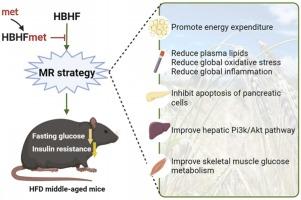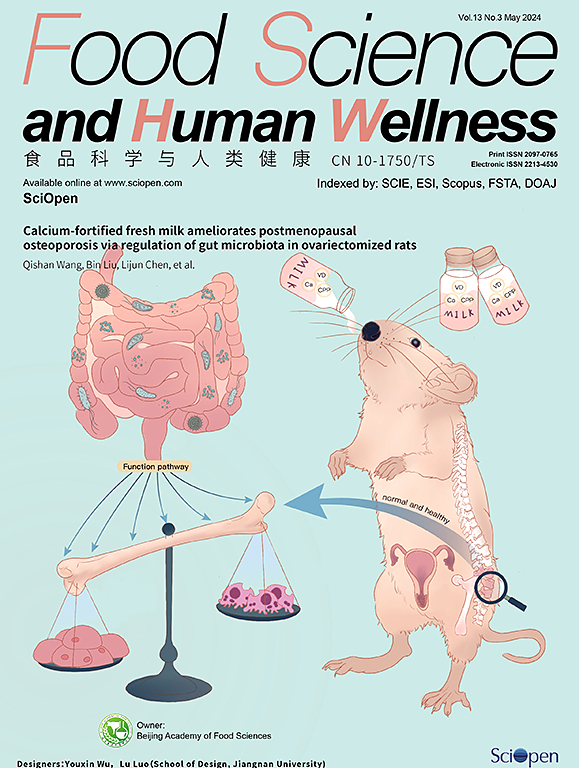Improvement of glucose metabolism in middle-aged mice on a high-fat diet by whole-grain highland barley is related to low methionine levels
IF 7.4
1区 农林科学
Q1 FOOD SCIENCE & TECHNOLOGY
引用次数: 0
Abstract
Methionine restriction (MR) is an effective dietary strategy to regulate energy metabolism and alleviate oxidative stress and inflammation in the body, especially in the middle-aged and elderly population. However, the high methionine content of meat products makes this dietary strategy impossible to combine with protein supplementation and MR. Highland barley (HB), a low-methionine cereal, not only provides the body with protein but also has improved glucose metabolism and antioxidant and anti-inflammatory properties. Therefore, this study evaluated the feasibility of HB as a source of methionine-restricted dietary protein and the potential mechanisms. Middle-aged C57BL/6J mice were fed a control diet (CON), a high-fat diet (HFD), a whole-grain HB high-fat diet (HBHF), or a HBHF + methionine diet (HBHFmet) for 25 weeks. The results showed that the HBHF could keep the body weight, fasting glucose, insulin, homeostasis model assessment of insulin resistance (HOMA-IR), blood lipids, inflammation, and oxidative stress of HFD mice at normal levels. Compared with the HFD groups, HBHF inhibited pancreatic cell apoptosis and improved insulin secretion while improving hepatic and skeletal muscle glucose metabolism. However, these efficacies were attenuated in HBHFmet group mice. These findings suggest that HBHF has an MR strategy.

全麦高原大麦对高脂饮食中年小鼠糖代谢的改善与低蛋氨酸水平有关
限制蛋氨酸摄入(MR)是一种有效的膳食策略,可调节能量代谢,缓解体内氧化应激和炎症,尤其适用于中老年人群。然而,由于肉制品中蛋氨酸含量较高,因此这种饮食策略无法与补充蛋白质和MR相结合。高地大麦(HB)是一种低蛋氨酸谷物,不仅能为人体提供蛋白质,还能改善葡萄糖代谢,具有抗氧化和抗炎特性。因此,本研究评估了 HB 作为蛋氨酸限制膳食蛋白质来源的可行性及其潜在机制。研究人员给中年 C57BL/6J 小鼠喂食对照组饮食(CON)、高脂饮食(HFD)、全谷物 HB 高脂饮食(HBHF)或 HBHF + 蛋氨酸饮食(HBHFmet)25 周。结果显示,HBHF能使HFD小鼠的体重、空腹血糖、胰岛素、胰岛素抵抗平衡模型评估(HOMA-IR)、血脂、炎症和氧化应激保持在正常水平。与高脂饮食组相比,HBHF能抑制胰腺细胞凋亡,改善胰岛素分泌,同时改善肝脏和骨骼肌的葡萄糖代谢。然而,这些功效在 HBHFmet 组小鼠中有所减弱。这些研究结果表明,HBHF 具有一种 MR 策略。
本文章由计算机程序翻译,如有差异,请以英文原文为准。
求助全文
约1分钟内获得全文
求助全文
来源期刊

Food Science and Human Wellness
Agricultural and Biological Sciences-Food Science
CiteScore
8.30
自引率
5.70%
发文量
80
审稿时长
28 days
期刊介绍:
Food Science and Human Wellness is an international peer-reviewed journal that provides a forum for the dissemination of the latest scientific results in food science, nutriology, immunology and cross-field research. Articles must present information that is novel, has high impact and interest, and is of high scientific quality. By their effort, it has been developed to promote the public awareness on diet, advocate healthy diet, reduce the harm caused by unreasonable dietary habit, and directs healthy food development for food industrial producers.
 求助内容:
求助内容: 应助结果提醒方式:
应助结果提醒方式:


